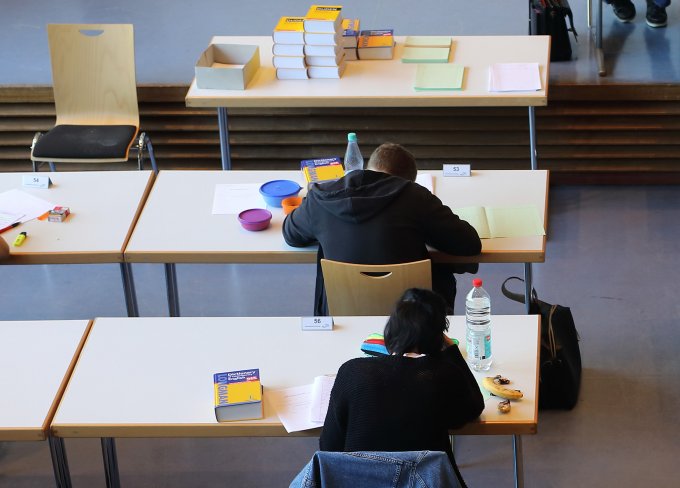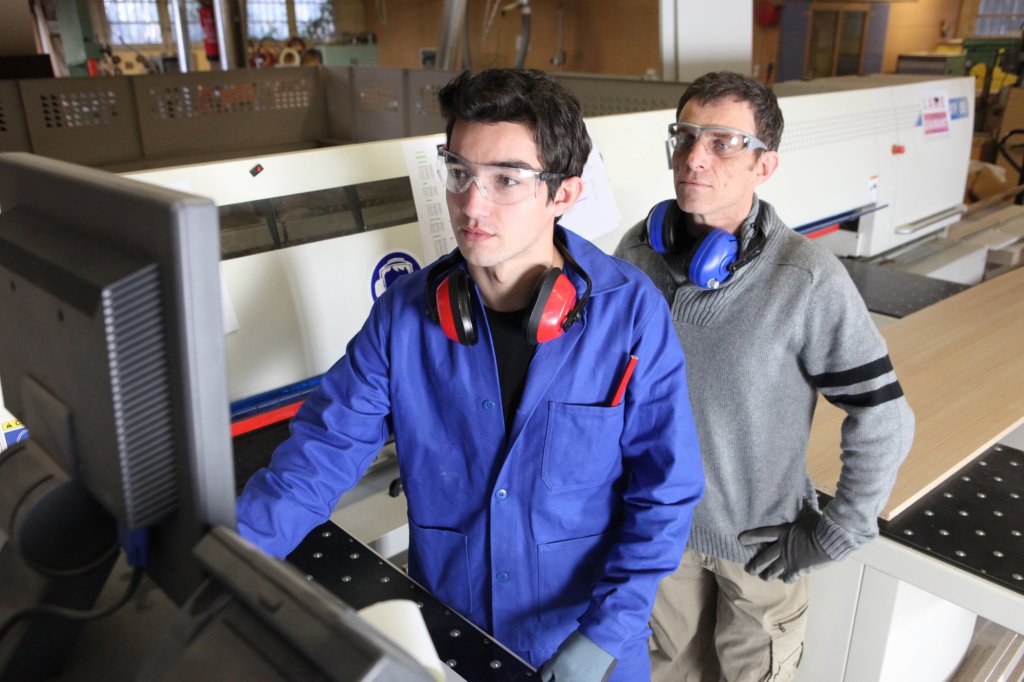The author of this article was born and raised in China, worked for several years after graduating from university, and then studied in Germany from 2000. Before the completion of the reform of the higher education degree system in Germany in 2010, she obtained the traditional Diploma in Economics in Germany.
Her husband is a native German. After obtaining German high school graduation "Abitur", he chose a dual system of vocational education in the banking industry, then went on to study at a German university, obtaining a Diploma in Economics.
The family has been living and working in Shanghai since 2005. Both children were born in Shanghai and have been attending the German School Shanghai (Deutsche Schule Shanghai) since the age of three starting in kindergarten. At present, their son is completing his German school career with the final exams, leading to the German high school graduation, the DIA ("German International Abitur"). After graduation he will choose the dual system of university education in Germany.

Before introducing my child's internship experience in companies, let's talk about the characteristics of German education in general, particularly focusing on the combination and enrichment of the academic path with practical elements, such as in connection with companies. One of the most well-known models of this educational approach is the dual vocational education.
As a model of joint training between schools and enterprises, dual vocational education was born in the 1970s, which was closely related to the socio-economic background of Germany at that time. After the Second World War, the German economy was transforming into a technology-intensive one, and enterprises needed more talents with both technical theoretical knowledge and practical experience, so the society attached more and more importance to an education combining theory and practice.
At that time, graduates of high schools could only gain limited knowledge about their potential future workplace, and a significant number of students realized after starting university studies that the academic path was not suitable for them. As a result, Germany implemented educational reforms in academically oriented high schools from the 1970s onwards by introducing a compulsory internship system, whereby every high school student had to complete a 2- to 3-week internship in a company in the 9th or 10th grade.
After the 10th grade, German high school students have several options:
- Those who wish to enter the workforce now, for example, are more practically inclined or see themselves more in practical areas, can switch to the vocational path and complete a dual vocational education, where they learn theoretical knowledge at a vocational school weekly or in block lessons and simultaneously acquire practical skills at a contracted company.
- Students who want to pursue the academic path with a stronger focus on practice can switch to the Fachoberschule (FOS) and complete it with the Fachabitur, which qualifies them for studies at German universities of applied sciences as well as at selected subject-specific universities.
- Students who choose the academic path continue their education at the Gymnasium, graduate with the Abitur (at the German School Shanghai: German International Abitur (DIA)) and can subsequently pursue studies at German or international universities.

Regardless of the path taken, the structure of the German education system allows individuals to obtain a higher school qualification, up to the general university entrance qualification (Abitur), through the so-called second educational path after completing vocational training or after obtaining the specialized high school diploma (Fachabitur), provided that the student meets the necessary admission requirements for this.
Since 2009, the dual system has been integrated with higher education, and students graduating from Gymnasium can also opt for the dual program, spending 50% of their time in university to learn management theory and professional knowledge, and 50% of their time in contracted companies to participate in management practice. The rotation between business practice and university studies is usually every three months. This system of enterprises and state academic institutions, which jointly develops curriculum standards, ensures that education and industry needs are closely aligned, provides graduates with alternative future perspectives and educational pathways, and allows companies to benefit from highly qualified graduates with practical experience. These highly qualified professionals in the companies thus represent an important pillar of the competitiveness of the German economy.
Back to the system of compulsory internships for German students. This system has been in place for nearly half a century and benefits businesses, students, and German society alike.

On the one hand, the internship system helps students experience the world of work before transitioning to higher education and avoids blindly choosing academic pathways.
While students in middle school (from 5th to 9th or 10th grade) have taken a wide range of STEM courses (science, technology, engineering, and mathematics), social science and language courses, arts and music, etc., in which they have found their interests and strengths, the internships then provide students with the opportunity to explore for the first time whether their interests align with their career aspirations, whether they are what they envisioned, and how the world of work outside the campus differs from the "ivory tower." Additionally, for those who have chosen an academic path, the experiences gained during the internship help inform their choice of future degree programs.
On the other hand, the internship system also helps companies, especially small and medium-sized enterprises (e.g. family businesses), to identify potential future employees. Additionally, the internship provides both the intern and the company with the opportunity to determine whether they align in terms of corporate values and the working culture within the organization.
My own internship experience

I recall several corporate internships during my student days, all during my university studies. The first corporate internship was during my university studies in China. The company I did the internship with was found through my parents' connections, and I didn't have to do much work myself. I don't remember exactly what I did, but it was a formality. In the end, I got an internship report stamped by the company and submitted it to the university to fulfil the requirements of the university's assessment.
For my Diploma in Germany, I had to do two internships. There was no difference between applying and interviewing for an internship and finding a job. After submitting my CV, going through many rounds of interviews, being rejected and ignored, I cherished the internships I got.
Internships were about getting involved in the day-to-day work of the department. Colleagues patiently introduced me to departmental processes and projects in detail, and I felt like I was not there for an internship, but rather, I was officially on board.
I developed wonderful friendships with my colleagues and invited them to my wedding. After I graduated, a colleague who had already jumped ship invited me to work for the company she oversaw. This is sort of the workplace network that my internship helped me build.
I was both intrigued and puzzled by internships for high school students:
- What can kids in their late 15's with no expertise do in a company?
- Will any company accept them?
- Do they have to rely on their parents' connections to help them find internships?
During the six months I spent with my son applying for internships, I found the answer.
Applying for Internships:
hits and misses, setbacks and frustrations

The German School Shanghai, where my son studied, organized a compulsory 2-week internship in the last two weeks of Year 10.
At the beginning of Year 10, the guidance teacher in charge of further education and careers not only gave the students a thorough introduction to the curriculum, the assessment, the application process and the template for the compulsory internships but also introduced the internship system to the parents at the parents' meeting at the beginning of the school year.
The school encourages students to find internship companies on their own and will only provide assistance if there are real difficulties. My husband and I were very supportive. So, my husband advised our son to start the application process six months in advance, such as taking photos dedicated to applying for internships, writing his CV, and making a list of intended industries and companies. About the application process, my son wrote this in his internship report:
The internship hadn't even started yet, and my learning process had already begun. During the summer holidays, almost six months before the internship started, my father told me that I should start applying to various companies. But I thought at the time that there was still a long time before the summer holidays. It was only at my father's repeated requests that I put together my CV and wrote my first application.
Over the next few months, I applied to a total of 12 companies, of which five rejected me, five ignored me and only two accepted me. One of these companies only sent me an acceptance letter a few weeks before the holidays, which made me realize that applying 6 months in advance wasn't as early as I initially thought.
Considering that companies in Germany, compared to German companies or other international companies in Shanghai, are familiar with the tradition of the "mandatory internship system", have experience in integrating interns into the daily work routine, as well as in the structure and organization of internship content, combined with my son's desire to experience what it is like to live alone for two weeks in an unfamiliar German city, he focused his 12 applications on companies in Germany. During the application process, he not only wrote emails to companies but also occasionally had to communicate by phone or in video interviews. These experiences were also new to him. It was evident to see how his initial nervousness gradually diminished and how he became increasingly confident over time. During a Chinese writing exercise, he wrote about this experience in a fictional story: ‘
‘Today is a very special day', thought Mali, 'This afternoon is my first interview!' Mali was getting nervous when he got home and started doing his homework. When it came to the promised five o'clock, the phone didn't ring. After a few minutes, the phone still didn't ring. After a few more minutes ...... Ma Li was thinking, ‘Am I looking at the wrong time?' Just at that moment the phone rang ......'
When the application deadline was approaching and my son still hadn't found a second-week internship through all his efforts, the father finally used his social network to help his son find the right contact at the company he wanted to apply to. The son followed the contact information and eventually completed the entire application process on his own, securing the internship.
A bit of advice
The process of applying for internships is a natural way to learn how to cope with frustration. Instead of directly offering assistance to the child, parents should take a step back and initially set aside their desire to help. Even if parents have a strong social network, they should not use it at first to help the child find an internship company, as this would take away a valuable opportunity for the child to gain experience and grow from it.
Multitasking:
building confidence under pressure

In addition to reaching out to internship companies, my son also had to prepare for the so-called "Zentrale Klassenarbeiten (ZKA)", exams that play a crucial role in determining a student's eligibility for the secondary school certificate, the German "Mittlerer Schulabschluss (MSA)". Furthermore, he voluntarily enrolled in the Chinese Proficiency Level 5 exam (HSK 5), which required him to memorize a significant amount of Chinese vocabulary and complete mock exam papers every week. He truly learned how to manage multiple pressures simultaneously. Ultimately, he secured two one-week internships, passed the ZKA exams, and obtained his HSK Level 5 certificate. Confronted with pressure and frustration, he navigated a cycle of frustration and renewed hope, in the end completing his tasks and achieving his goals through his own efforts. This life experience has significantly matured my son. He has gained a deeper understanding of and confidence in his own abilities, becoming more courageous in the face of challenges. Now in Grade 12, my son has chosen a demanding dual-university program that offers dual certificates. Looking back, his courage, confidence, and motivation are clearly evident.
Two very different internship experiences: self-assessment, self-planning

In his internship report, my son provided a detailed account of two distinct internships.
At Company B's IT department, he encountered many interns all working in a classroom-like setting. Although the interns did not have access to the actual company department, they were assigned simulated tasks, such as designing web pages for new products to be integrated into the company website. Learning a new programming language quickly and independently plus collaborating with other interns, whom he had just met, proved to be both challenging and enjoyable for my son.
In contrast, his internship in the tax department at Company K was quite different. He was the sole intern in the company and was placed directly within the department where his work assignments were located. This arrangement allowed him to truly immerse himself in the department and gain a deeper understanding of the industry. During his internship, he learned how to deal with legal texts and apply them to specific situations. Initially overwhelmed by complex legal documents, he quickly developed the ability to identify relevant laws and extract pertinent sections to grasp the essence of the legislation. Another crucial aspect was applying these legal texts to specific scenarios, which required a thorough understanding of the law and careful analysis of the facts to arrive at the correct conclusions.
These two vastly different professional experiences not only demonstrated him his capacity for learning but also helped him identify his interests and strengths. He concluded his internship report with the following remarks:
I have been interested in the IT industry for some time now. I've been fascinated by technology and computers for many years, and I'm captivated by the constant growth and innovation in this field.
What excites me about IT is the opportunity to find innovative solutions to complex problems. Whether it's software development, networking or data analysis, the world of technology offers countless challenges. The chance to develop innovative solutions greatly motivates me.
On the other hand, the tax industry requires a high degree of accuracy, attention to detail, and expertise. It's a complex and dynamic field where laws and regulations change frequently. For someone who is passionate about numbers and finance, this can be an incredibly exciting challenge.
However, I personally realized that my interests and strengths lie in different areas. Nonetheless, I acknowledge the importance of tax knowledge and its impact on our daily lives.
Applying for an internship:
career-oriented education

It was an internship at Company B that opened my son's eyes to the possibilities of combining IT specialization with the integration of theory and practice. After graduating from a German high school, my son had several options for his studies:
- Direct entry into a comprehensive university (in German: Universität/Hochschule) or university of applied sciences (in German: Fachhochschule)
- Enrolment in Dual Vocational Training (in German: Berufsausbildung)
- Choice of a Dual University Program (in German: Duales Studium)
- Simultaneous completion of both a Dual Vocational Training and a Dual University Program (i.e. Dual Certificate Program) (in German: Duales Studium mit Berufsausbildung)
After a thorough evaluation of the pros and cons of each pathway, he chose a dual program with dual certificate in IT.
In addition to the compulsory internships, German high schools offer various career-oriented projects and activities in years 9-12 resp. 13.
For instance, the German School Shanghai organizes regular seminars about business administration and university as well as career information days, and job search workshops. The school maintains close ties with alumni and German companies in Shanghai regularly inviting returning graduates or executives from German companies to share their personal experience related to studying and job hunting with the students. The school also receives up-to-date information on German universities and colleges from the German Academic Exchange Service (DAAD). Whenever needed, students can access personal counseling from professional educators who can assist them with self-assessment and address questions about further education and career opportunities.
Advice: The beneficial system of compulsory internships in high schools is closely tied to supportive policies and strong backing from companies, making it a system upheld by the entire German society. While the age limit for working varies from country to country, as does the extent to which companies welcome interns, young people in a non-German education system can still seek internships during their high school holidays.
Visit us

Contact Us
📧 admissions@ds-shanghai.de
📞 +86(21) 3976 0555-355


























